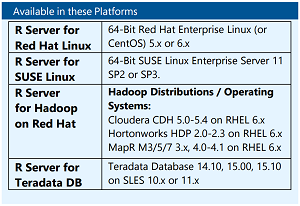Microsoft Retools R Offerings for Big Data Analytics
Microsoft hasn't been standing still since it became the new commercial steward of the R programming language by acquiring R specialist Revolution Analytics a year ago. The company has been busy revamping its acquired R offerings, including the open source version.
That free download, along with a free developer edition, highlighted a reorganization and rebranding of Microsoft's R products, now called Microsoft R Server.
Along with upgrading and maintaining the open source version, Microsoft exec Joseph Sirosh detailed other open source-related initiatives the company has made surrounding R in a blog post yesterday. For example, he noted that Microsoft became a founding member of the R Consortium, formed "to provide support to the R community, the R Foundation and groups and individuals, using, maintaining and distributing R software." Such moves are furthering Microssoft's transition from a bastion of proprietary, insular software to a champion of the open source movement.
"Microsoft R Open enhances the performance of R with multi-threaded processor optimized computations provided by Intel Math Kernel Libraries (MKL) delivering large speedups especially in matrix-oriented computations," Sirosh said. "It also makes it easier to build reliable applications with R on Windows, Mac and Linux by simplifying the management of R package versions. Microsoft R Open is 100 percent compatible with all R scripts and packages, and just like R is open source and free to download, use and share."
The R language is
popular in the Big Data world because of its statistics capabilities and facility for predictive analytics. The new Microsoft platform consists of the acquired company's offering, Revolution R Enterprise (RRE) for Hadoop, Linux and Teradata -- described as a Big Data-capable R distribution for servers, Hadoop clusters and data warehouses -- along with Microsoft quality enhancements, support and purchasing options.
In another blog post yesterday, David Smith of Revolution Analytics said that, in addition to its new name, "Microsoft R Server includes an updated R engine (R 3.2.2), new fuzzy matching algorithms, the ability to write to databases via ODBC and a streamlined install experience."
Sirosh expounded on the new features and provided further details about the company's R revamp. "Microsoft R Server is a broadly deployable enterprise-class analytics platform based on R that is supported, scalable and secure," he said. "Supporting a variety of Big Data statistics, predictive modeling and machine learning capabilities, R Server supports the full range of analytics -- exploration, analysis, visualization and modeling. By using and extending open source R, Microsoft R Server is fully compatible with R scripts, functions and CRAN packages, to analyze data at enterprise scale. It also addresses the in-memory limitations of open source R by adding parallel and chunked processing of data in Microsoft R Server, enabling users to run analytics on data much bigger than what fits in main memory."
 [Click on image for larger view.]
Platform Options (source: Microsoft)
[Click on image for larger view.]
Platform Options (source: Microsoft)
Sirosh said Microsoft wants to make Microsoft R Server the enterprise standard for cross-platform analytics in the cloud or on-premises.
"Delivering Microsoft R Server across multiple platforms allows our enterprise customers to standardize advanced analytics on one core tool, regardless of whether they are using Hadoop (Hortonworks, Cloudera and MapR), Linux (Red Hat and SUSE) or Teradata," Sirosh said "For Windows, Microsoft R Server will be included in SQL Server 2016 as SQL Server R Services -- and the combined bundle is less expensive than RRE standalone. Until SQL Server 2016 is released, Revolution R Enterprise for Windows remains available as a standalone product." The company hasn't specified exactly when SQL Server 2016 will be released, but, barring a name change, it should be this year.
Microsoft, famously characterized by its former CEO as being all about "developers, developers, developers," is also offering a free Microsoft R Server Developer Edition, via Visual Studio Dev Essentials, including all the features found in the commercial version.
That developer edition will also be included in the new Microsoft Data Science Virtual Machine as a pre-installed and pre-configured component. That VM is described as "a Windows Server 2012-based custom virtual machine image on the Azure marketplace containing several popular tools that can be used by data scientists and developers for advanced analytics."
Microsoft R Server is also available free to students for academic use through the company's Microsoft DreamSpark program.
"Advanced and predictive analytics is about developing and testing new models," the company quoted IDC analyst Dan Vesset as saying. "But it's also about their incorporation by developers into production deployments of decision support and automation solutions that can benefit the whole organization. With its new offerings for the R ecosystem, Microsoft is playing an important role in bringing analyst modeling and productivity tools as well as deployment tools to a broader audience."
Posted by David Ramel on 01/13/2016